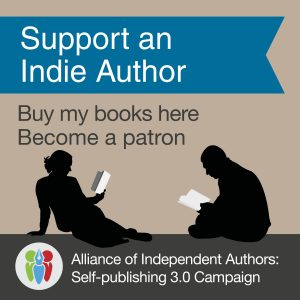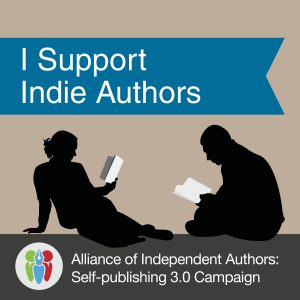
Orna Ross, Director of ALLi
In the final part of her series on Self-Publishing 3.0, ALLi director Orna Ross encourages authors to set up for a new phase in self-publishing: attracting direct buyers and patrons, without any intermediary but a payment cart process and selling direct. Go here for a practical guide to setting up your author website for direct sales.
When ALLi Professional Member Morgana Best was interviewed on this blog for our Inspirational Indie Author feature, alongside the great advice she offered to indie authors she asked an important question: “Why build your empire on rented land?”
“Own and develop your own real estate,” Morgana said. “Send readers to your own website or your own app – to anything you own.”
This is excellent advice and we are seeing more and more of our most successful members following it.
This is the most important trend now emerging for authors and increased author confidence is coming together with other favorable conditions and consumer trends to make this possible now in a way that it wasn't before. The rise in the maker movement, in personal branding, in mindful consumption, in mobile phone sales and in new technologies like the blockchain are all pointing in this direction.
- Self-Publishing 1.0 and 2.0 have taken increasing numbers of writers out of the “publish-me-please” mentality that was all-pervasive when trade publishing was the only route to market.
- People are tired of big brands pretending to be human, pretending to care. We who really are human, who really do care, are benefitting from this.
- A growing band of consumers is seeking out mindful services and personal products and shopping experiences, online and off. See the growth in hand-crafted products, farmers markets, indie stores.
As part of our Self-Publishing 3.0 campaign, ALLi is now encouraging members to sell direct, by ensuring that their author websites are transactional.
Increased Reader Confidence
As we've seen in the first two parts of this series, Self-Publishing 1.0 began in the 1990s with desktop publishing and print-on-demand technology. Self-Publishing 2.0 kicked off with the Kindle in 2008, and quickly saw the rise of ebooks, ereaders and online bookstores. Self-publishing 3.0 is seeing authors developing their own sustainable and scalable creative enterprises.
A core part of this is authors going direct to readers, without any intermediary except a cashpoint.
Ten years ago, when digital self-publishing emerged as a real possibility for mainstream authors, readers were suspicious of giving their credit card details to online retailers. Now most people have made an online purchase and transactional technology makes it very easy for readers to buy on your author website.
This is not about coming off the retailers. Online retailers like Amazon, Apple, Kobo and others make amazing things happen for authors, every day. But at ALLi we also see authors who've been selling well (some as many as six figures) on Amazon or another outlet (having spent a fortune on ads to take readers to those pages) suddenly finding their sales plummet. We've seen social media accounts where authors ran their bookshop e.g. Facebook pages, suddenly and summarily shut down.
The author often doesn't know why. They cannot do their own analysis. They have built their real estate on rented land. They have no control, no data, and no assets. Overnight, they are out of business with no way to leverage years of work and investment.
The only way to avoid this fate is to build your own piece of publishing real estate on the Internet.
Direct sales for Authors
If authors are to make a living from writing, we need to build assets and processes that enable sustainable profits.
We need to build our business, step by step. This means seeing the retailers/trade publishers/social media sites/everyone we work with as partners, not effectively giving them ownership of our businesses.
For example,
- Instead of using Facebook ads to draw people to our Amazon page, we draw them to our own sales pages.
- We make sure we have a donation button on our website and an inspiring, entertaining or otherwise interesting offering on site for which a reader might donate.
- We make it quick and easy to buy ebooks on our site (no asking for street addresses and other unnecessary details).
- We don't spend more time and money on somebody else's website (Mark Zuckerberg's, for example) than we do on our own.
The aim is to build direct sales, subscriptions, courses and patronage and other earning models on our own websites, in addition to using retailer routes to readers, like Amazon, Apple, Kobo, Google and aggregators like Draft2Digital or PublishDrive.
Many authors who set up for selling books soon find themselves offering other products and services too. Authors who have embraced self-publishing 3.0 have websites that function in one or more of the following ways:
- a shop selling ebooks and other information, inspiration or entertainment products and services directly to readers.
- a Donate button and encouragement for readers to express appreciation through donation.
- a teaching platform for courses
- a coaching or consultancy hub
- a place to attract clients for freelance work
- a place to offer, and take payment for, other services, tools, or products that have nothing to do with your books.
- a membership website that offers a premium product or experience to close readers
- a place to recommend other services, tools, or products that can bring in affiliate income.
Or other options that fall under one of the ten business models now open to authors.
You are limited only by your creativity, the quality of your offerings and your ability to attract customers. And your writing and publishing skills.
Of course, your success in self-publishing, whether going direct to readers or through retailers, is predicated on being not only a good writer, but a good publisher too.
Your book must be self-published to professional standards. You must know how to market them. You must run promotions that work. You must attract traffic to your website and then convert a portion of that traffic into customers.
Self-publishing 3.0 has already begun: some authors already successfully sell directly to readers through their own websites and some are already on a blockchain, preparing for when that technology becomes significant in the book world.
How to Help Your Readers to Embrace Self-publishing 3.0
Part of Self-publishing 3.0 is educating your readers. As authors, we often underestimate the influence we can have with readers.
Few readers understand publishing–why should they?– so they are surprised when they find out that when they spend almost £10 on a book in a bookstore on a trade-published book, an author receives less than £1. They think all writers are rich, that if they've heard of you, you must be famous (and if they haven't, not).
They are truly shocked to hear that most writers in the trade model are earning less than the minimum wage.
They need us to explain to them things like:
- how many hours our websites and blogs, and other activities, take to put together
- how they can support us in our endeavors and why they might
- what a difference it makes to us when they buy directly from us
- how much a donation or other form of patronage means to our ability to keep going
Help your readers to understand the changes that are happening in publishing, why that is positive for you and how they can become part of it.
Your fans and followers like being part of what you're creating. Their liking for your books can very easily turn into something more.
ALLi's Self-Publishing 3.0 Campaign
As part of ALLi's Self-publishing 3.0 campaign, we have produced two badges that you are welcome to use on your website and elsewhere.
One is designed for you to use on your own author website:

Use the following code to embed in your site:
<a href="https://www.allianceindependentauthors.org/self-publishing-3-0/"><img class="aligncenter wp-image-5813 size-medium" src="https://www.allianceindependentauthors.org/wp-content/uploads/2018/06/Writer-ALLi-Badge-3.0-300x300.jpg" alt="Support an Indie Author" width="300" height="300" />
The second is for use by readers, booksellers, and other parties who would like to demonstrate their support for indie authors.
Use the following code to embed in your site:
Unchanged: <a href="https://www.allianceindependentauthors.org/self-publishing-3-0/"><img class="aligncenter wp-image-5811 size-full" src="https://www.allianceindependentauthors.org/wp-content/uploads/2018/06/ALLi-Badge-3.0-Reader-Badge.jpg" alt="I Support Indie Authors" width="300" height="300" /></a>
Making these badges available is just one of many actions ALLi is taking as part of our Self-publishing 3.0 campaign, which we hope will play a significant part in raising awareness of the expanding opportunities for authors to earn a living from their writing and associated activities.
And opening a wider, and more informed, conversation about the indie movement among readers and key influencers.
#Indieauthors - Are you part of #Selfpublishing 3.0? Read @OrnaRoss's advice about direct selling on your author website and treating other platforms as partners Share on XIN CASE YOU MISSED THEM:
The Previous Parts of this Series on Self-publishing 3.0
https://selfpublishingadvice.org/indie-authors-are-we-ready-for-self-publishing-3-0/
https://selfpublishingadvice.org/indie-authors-are-we-ready-for-self-publishing-3-0-part-2-blockchain-for-books/
SERIES CONCLUDED.





Orna,
An eye-opener in many ways. Thank you.
Is there a way to install a patronage option (Donate button) on one’s home page without making it look cheesy and coming across as begging? Or is that just it? Any examples of authors who use it—successfully?
This sounds interesting. But some states, California and Texas among them, have tax laws requiring registration with state taxing authorities. They want to collect BIG bucks in annual franchise fees for any direct sales in their states, regardless of the volume. Plus they require quarterly sales tax filing. For many self-pubbed authors, the tax hassle just isn´t worth it.
All sounds good till I start thinking about the hassle of handling EU VAT requirements from my spot here in the States.
Using StreetLib Stores we can sell not only our own books but also those of other authors, with a ready-made store (and a catalogue of over 323,000 titles) and all the hassle of global payment processing, local taxes, file delivery, etc, taken care of.
This is one level short of direct selling in that we don’t ourselves get the customer email address to upsell, but is a very easy starting point for those without their own websites and shopping carts.
The great thing is, not only do we collect up to 75% on our own titles when we send readers to StreetLib Stores, but we can earn 15% on the sales of other authors’ titles if the reader decides to buy any while there.
In the domestic markets readers may be reluctant to step outside their preferred retailers, but for the foreign markets StreetLib Stores offers local currency purchasing in countries as diverse as Mexico, Turkey, Ghana, Nigeria, Uganda, etc.
Big round of applause for one more step away from digital sharecropping. Let’s plant and harvest in our own soil, not everyone else’s.
Question:
I originally set up my website to sell my books direct, and within weeks took down the digital books because nobody could figure out how to get them onto their device.
Is that still an issue for the average reader? Or is there evidence that the average person can now download and install a digital book without tech support from the author?
Sites like BookFunnel specialize in providing the user support necessary for readers to sideload books and take all that hassle away from you.
Hi,
Could you give a few examples of what the problems and questions were please? And what format were you offering your books; PDF, mobi, etc.?
Thanks,
Shane
Really interesting view of the future but with postage costs so high in the UK how do we compete with free delivery from Amazon?
The smart business model is to focus on where you can compete, not where you can’t. You can deliver a digital version of your book for the same delivery costs as Amazon: none.
Also, as I go back to this model (which I stopped doing years ago) I’ll finally be checking into The Book Depository, recommended by many of my author friends: https://www.bookdepository.com/
They act as your distribution network, narrowing the shipping cost margin between you and Amazon.
The Book Depository is actually owned by Amazon, but agreed, all additional reach is to be valued.
Interesting and inspiring post. Will there be a follow up ‘how to’ guide with recommended plugins, shopping carts etc?
Aviya, I’ll check that out for you but really, as part of Self-Publishing 3.0, you should ideally own your own website. Here’s an article about how and why to do that: https://www.ornaross.com/creative-entrepreneur-self-hosted-website/
These are great and I would love to put them on my website! I’m wondering if you have a code that integrates with wordpress widgets? I’m not on the full business plan, so I can’t embed code into my website content itself.
Thanks again for this great post!
Aviya, as a web guy for two dozen years I agree with Orna about owning your own website. The transition from WordPress.com hosting your site to your own self-hosted copy is not too difficult and it’s well worth making.